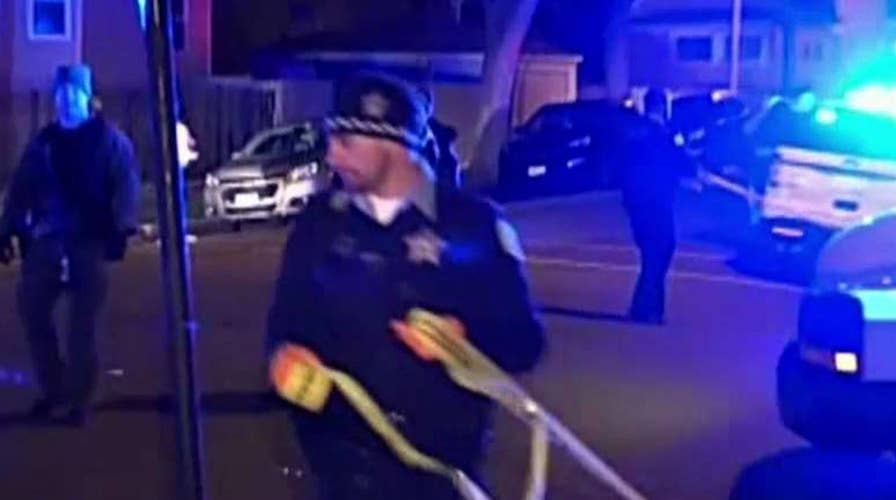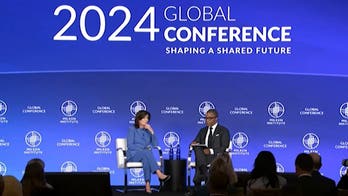Critics blame Chicago murder spike on ACLU agreement
Officers are now required to document the details of every single stop to be compiled by the organization; Matt Finn goes in-depth for 'Special Report'
Every day seems to bring new tragedy on Chicago’s streets. Three people, including two 15-year-old boys, were murdered over the weekend, according to police, as 19 others were wounded in shootings.
The bloodshed is only reviving questions of whether leaders can find a solution to the city’s violent crime – and whether the politics of policing is costing lives.
"Politics is a cancer to good policing and we're seeing the results right now,” said Chicago’s former police superintendent, Garry McCarthy. “I think the political landscape in this country for the last couple of years has taken us down this path and it’s time to recognize that what we are doing is not working.”
According to a comprehensive new study by the University of Chicago Crime Lab, the city’s exclusive contract with the American Civil Liberties Union could be having a significant impact on Chicago’s crime.
“This is one of the few dramatic changes where the timing does fit the increase in homicides and so it seems it would be rash to reflectively rule this out as a possibility,” said Dr. Jens Ludwig, the director of the University of Chicago’s Crime Lab.
The agreement the city of Chicago struck with the ACLU in 2016 requires that officers fill out paperwork after every single stop, with the information to be compiled and analyzed by the ACLU.
The president of the Fraternal Order of Police, Dean Angelo, says at best the ACLU contract is making officers’ job difficult. At worst it’s costing lives.
“Let the police do their job,” Angelo said. “Let the police department write its order, don’t give your authorship to the ACLU because now you’ve hugely impacted policing as we know it to be.”
As the ACLU requirements were rolled out in 2016, police stops plummeted by over 80 percent, according to police. Angelo said officers feared being labeled racist or losing their job.
"It's the amount of the above and beyond type of activity that officers were engaged in that we may not see at that same level ever again,” Angelo said.
The ACLU defends the current approach.
Research compiled by the group determined over 250,000 people were stopped by police in the city of Chicago in the summer of 2014. Seventy percent of those “stop and frisks” were for black people and some were illegally harassed and publicly profiled, the ACLU says.
"Most of us never saw this,” said Karen Sheley, director of police practices at ACLU Illinois. “Never saw the experiences of the black Chicagoans around stop and frisks, but it was harmful to the community."
Statistics show Chicago’s most violent districts largely are made up of black residents; and the majority of police stop and frisks are chronically uneven. However, the ACLU says its research indicates black residents were targeted even in majority white, affluent neighborhoods.
McCarthy’s time as the top cop in Chicago abruptly ended in 2015, when he was fired by Democratic Mayor Rahm Emanuel after the release of the police shooting video of Laquan McDonald.
McCarthy, who maintains he was thrown under the “political bus,” acknowledged: “There are some of these videos we’ve seen which are beyond comprehension and I don’t know what these officers were thinking.”
But McCarthy also was credited with reducing the city’s crime to lows not seen in decades.
Hovering over Chicago’s latest struggles was a Department of Justice investigation into the Chicago Police Department that painted the department as racist and in need of better training and oversight.
McCarthy claims the DOJ report was politically motivated and says he’s frustrated that former U.S. Attorney General Loretta Lynch said he was unavailable to discuss the investigation into the department that he ran for years.
"When I saw Loretta Lynch say that I was unavailable -- it's disgust, that's probably the best way to put it," he said.
The Trump administration has not commented on whether it will enforce the DOJ report put out under the Obama administration.
The ACLU says the drop in police stops is a victory for minorities, and the “broken” police department is to blame for the spike in crime.





